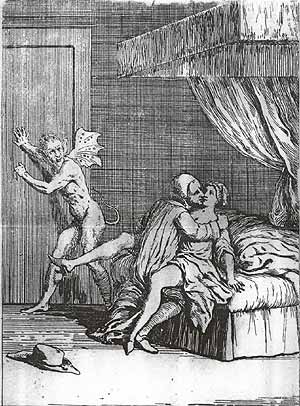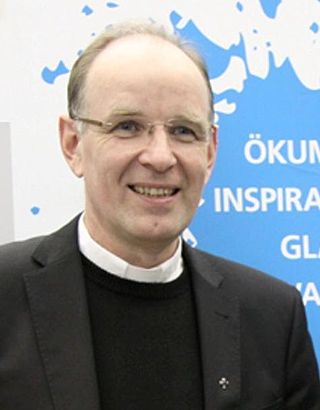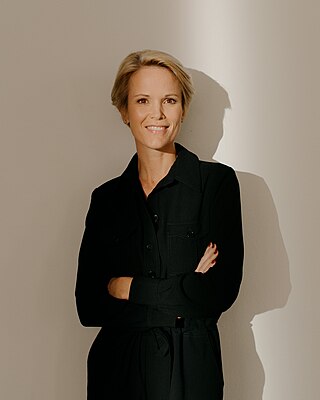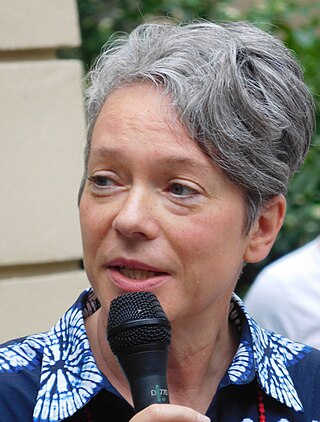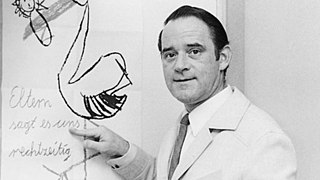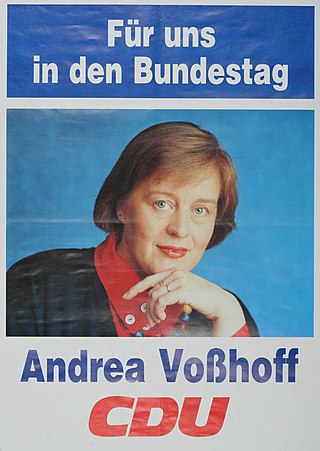Official school letters, found in archives and reviewed in a dissertation, point to sexual abuse of girls and boys under the management of school founders Paul and Edith Geheeb. However no one contacted the police. [3] [4]
In 1998 reports from former students were made public, according to which the then-headmaster Gerold Becker had sexually abused multiple students in the 1970s to the 1980s. [2] Andreas Huckele, a former student, who attended Odenwaldschule from 1981 to 1988 and was later protected by the Frankfurter Rundschau with the pseudonym Jürgen Dehmers, had sent two letters to headmaster Wolfgang Harder in June 1998.
The school explained in 1998 that the former headmaster had never contradicted "the victim's statements when he had to meet with the board of directors and vacated his functions and duties". In 1998 the victims of sexual abuse met with the former headteacher Harder and the former SPD-MP Peter Conradi - as the vice-president of the sponsoring organisation - and agreed to review the abuse accusations, but this did not happen as promised. [5]
In the late 1990s, and again in 2010, the school became the center of national attention when an investigation revealed the sexual abuse of more than 130 pupils by at least 8 teachers in the 1970s and 1980s. [6] [7] [8]
Review
One year later the Darmstadt prosecution service dismissed the penal case review due to statutory limitations. When Jörg Schindler reported the accusations in the Frankfurter Rundschau in November 1999, Florian Lindermann, the spokesman for the former students, criticized the coverage as over the top.
In 2010 Margarita Kaufmann, headmistress at the school since 2007, called for a new inquiry into the sex abuse cases. Kaufmann spoke of 33 victims that she knew of, and eight teachers that she believed were guilty of sexual assault between 1966 and 1991; it was assumed that more than ten teachers were perpetrators. The music teacher Wolfgang Held, who died in 2006, was named as the main perpetrator alongside Becker. [9] The Frankfurter Rundschau daily newspaper reported on 6 March 2010 that they believed that there had been between 50 and 100 victims. The Darmstadt prosecution service dismissed six of the 13 preliminary proceedings. At the end of May 2010 the prosecution service investigated six former teachers and one student. [10] There was no court ruling until the end of 2012.
In a letter sent by Gerold Becker to the Odenwaldschule community in March 2010, he asked his victims for forgiveness and renewed his offer to come forward and speak to the victims. Becker died on 7 July 2010 without suffering legal consequences. [11]
The board of directors at the Odenwaldschule initially rejected the idea of financial compensation for the victims in a July 2010 letter. [12] In September 2010, however, the board of directors promised financial compensation for 50 former students who were affected. Additionally, there remained further unresolved cases requiring review. [13]
The lawyers Claudia Burgsmüller and Brigitte Tilmann were entrusted with the task of reviewing the sex abuse cases in 2010. According to the final report, released on 17 December 2010, at least 132 students were victims of attack by teachers between 1965 and 1998. The lawyers who wrote the report said the documentation was incomplete. [14] [15]
In March 2011 Christian Füller's monograph, entitled Sündenfall. Wie die Reformschule ihre Ideale missbrauchte (literally: "The Fall from Grace. How the Reform School Abused its Ideals"), was published. Füller calls the school, when it was under Becker's management, a "reformed education paradise with a torture chamber in the basement" based on the model of an "aristocratic patriarchy". He speaks of paedophiles and "robbers of childhood", which had systematically taken over the part of the school. [16]
Two months later Tilman Jens, a former student and until the summer of 2014 a member of the Odenwaldschule's sponsoring organisation, published the book Freiwild. Die Odenwaldschule - Ein Lehrstück von Tätern und Opfern. (literally: "Fair game. The Odenwaldschule - a lesson of attackers and victims.") Jens demanded more balanced coverage: contrary to the customs of the constitutional state also innocent people were denounced as assailants or co-assailants. [17] In October 2014 an article of in Deutschlandfunk reported him as saying that even if the film Die Auserwählten (The Favored Few) was filmed at the Odenwaldschule -showing a willingness on the part of school's management to confront the history of misconduct -it failed in previous years to reach further resolutions. [18]
In September 2010 several victims formed a group called Glasbrechen (literally - breaking of glass), with the goal of helping people who had experienced sexual, physical and psychological attacks. [19] [20]
In July 2011 the former headmistress Kaufmann resigned from her office to focus on the review of the sexual abuse cases. [21] In 2011 the club Odenwaldschule e.V. with the Altschülervereinigung und Förderkreis der Odenwaldschule e.V. (literally: "Association of former students and society for promotion of the Odenwaldschule") formed the foundation "Brücken bauen" (literally "building bridges"). [22] [23] According to its charter the foundation carries out and supports measures to aid victims of sexual violence, physical, psychological abuse at the Odenwaldschule. [24]
A fierce critic of the legal review process is Andreas Huckele, who published his book Wie laut soll ich denn noch schreien?, under a pseudonym. In his acceptance speech for winning the Geschwister-Scholl-Preis in 2012 he criticized the lack of action taken by the school since the first article was published in the Frankfurter Runschau in 1999. [25]




